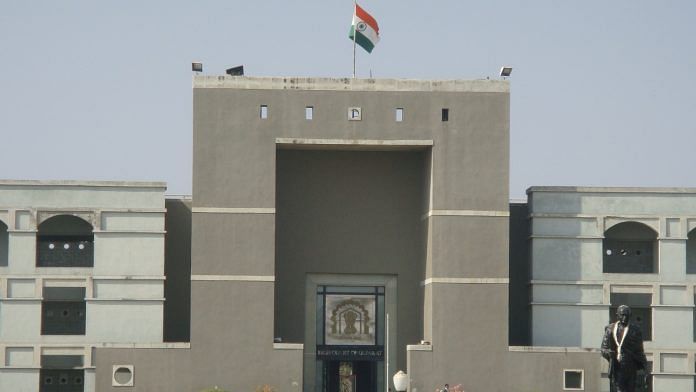New Delhi: The Gujarat High Court has refused to drop dacoity charges against a man who was arrested in connection with the anti-CAA protests in December 2019. It has been alleged that Satish Pravnbhai Vansola had stolen the keys of a state transport bus that was plying on the route of the protest site in Chhapi city.
Petitioner Vansola had moved the high court to set aside section 395 of the Indian Penal Code (IPC) that deals with the offence of dacoity. According to him, the penal provision was added later to the FIR that was registered at the Chhapi Police Station.
Section 395 prescribes life imprisonment for dacoity or rigorous imprisonment of 10 years and fine.
Multiple other criminal charges, including threatening, have been invoked against him, besides the Prevention of Damage to Public Properties Act, 1984.
A bench led by Justice Gita Gopi rejected Vansola’s petition that had challenged the dacoity charges on merit and on the ground that he was not present at the protest site on the alleged day of the incident.
Vansola had claimed that the local police detained him a day before the protest was scheduled, after authorities withdrew permission to hold the agitation.
The dacoity charge was added to the FIR following a request made by the deputy superintendent of police, the petition says.
“It appears from the record that during the course of committing theft of the keys of the state transport bus, the petitioner had placed the driver of the said bus under the fear of instant death. In that process, the petitioner had also restrained the driver of the said bus from proceeding to its destination,” held the court in its 6 July order.
Also read: CAA protesters’ arrest ‘designed to send chilling message’: UN asks India to free activists
‘Dacoity section added as an afterthought’
Vansola and his associate had sought permission from the district administration of Chhapi to organise a gathering on 19 December 2019 to commemorate the death anniversary of freedom fighters Ashfaqullah Khan and Ram Prasad Bismil.
On the basis of a recommendation given by the Chhapi Police Station, the authorities concerned had accorded permission to hold the meeting, and communicated the same to Vansola on 18 December. But on the same day, a sub-inspector wrote to the authorities to cancel the permission, says the petition.
After the permission was withdrawn, the police detained him as well as three other persons associated with the program the same day (18 December).
Since the withdrawal of permission was not communicated to all members, a huge crowd had gathered at the spot on 19 December and subsequently turned violent. A case was later registered against Vansola and the others. Four days later, the dacoity section was also included in the FIR against Vansola.
The ground cited for adding dacoity charge to the FIR is the snatching of keys by Vansola of a state transport bus that was plying on the route of the protest site.
Vansola contended that even if the police version of his being present at the spot is true, he can only be held liable for blocking a public road. He was booked for dacoity in the third supplementary chargesheet that was filed in the case, suggesting that it was an afterthought on the part of the police.
The petitioner submitted that he made no attempt to rob the driver of the vehicle or cause any injury to anyone.
‘Bus driver was under fear of instant death’
While the court dismissed Vansola’s contention that he was not present at the site, it discussed the law, in the context of IPC section 395, to say that evidence brought on record establishes a link between an act of “theft”, “wrongful restraining” and “robbery”.
The court recorded from the chargesheet that there were about 3,000 persons at the site and said the ingredients for the offence of dacoity were “prima facie” made out.
“It appears from the record that during the course of committing theft of the keys of the state transport bus, the petitioner had placed the driver of the bus under the fear of instant death. In that process, the petitioner had also restrained the driver of the said bus from proceeding to its destination,” the court observed.
Also read: Delhi, UP oppose Sharjeel Imam’s plea to consolidate sedition FIRs for his AMU speech



